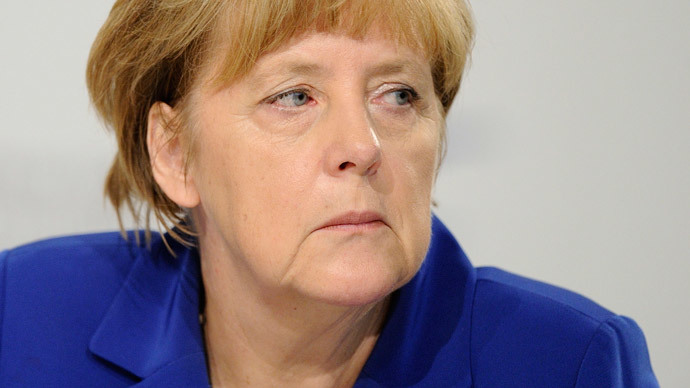‘Germany loses its position as EU economic power house’

With current forecasts Germany can’t keep up the rates of economic bailout and credit support that it has previously given to South European countries, the director of the Freedom Association in the UK Rory Broomfield told RT.
The EU summit on jobs and growth this week in Italian Milan triggered protests and calls on the Italian government to put an end to the austerity policies advocated by Germany. German Chancellor Angela Merkel, who took part in the gathering, is seen as “Austerity Chief” and many blame her in particular for the current economic situation in eurozone states like Italy, Spain and Greece. Even France, whose economy is more stable, calls austerity measures absurd. At the same time Germany, which is considered to be the strongest EU economy, faces problems itself, with slowing growth rates.
RT:It looks like there's a growing voice in the EU against Berlin's austerity drive, but isn't the UK proving that austerity can work? We need to just look at its growth figures. So do France and Italy actually have a leg to stand on when complaining?
Rory Broomfield: We have got to remember that the UK is outside the eurozone, so the UK has its own currency and can manage its own monetary affairs. That’s a very different picture from France, Italy and many other countries around the EU, which decided a number of years ago to go into this arrangement, and have effectively signed up to a number of rules and regulations, which tie their economic fortunes to that of other countries like Germany and like many others across Europe.
Professor of political economy Gustavo Piga on austerity measures: “What we are seeing right now France and Italy are asking for is not an end of austerity. Unfortunately, what they are asking for is simply just decreasing austerity.”
RT:We see disenchantment with Berlin growing among European leaders. Are they losing trust in Germany as the bloc's leading economic decision maker?
RB: I think that’s evident and it would always be so when Germany has a very different economy and even economic outlook to many other countries and the peoples of Europe. You have got to look at the unemployment rate, especially the youth unemployment rates across Southern Europe especially. And you look at rates of 44 percent in Italy – no wonder they are on the streets – because 44 percent up on last year figures is economically disastrous for an Italian economy that is trying to get out of economic stagnation and recession, trying to effectively make its own way in the world. So I agree that there is a distrust and disenchantment with Germany’s economic plan because it doesn’t fit Italy’s plan.

RT:Berlin is unwilling to change the austerity plan. At the EU job summit in Milan budget cuts were off the table because Germany didn't want to talk about anything else but unemployment. Is it actually possible that Berlin could be pressured to change its stance?
Professor of political economy Gustavo Piga on austerity measures: “Keep in mind that the monetary policy is absolutely helpless. What we need is to cancel that stupid thing of Fiscal Compact [Treaty on Stability, Coordination and Governance in the Economic and Monetary Union] that no other country in the world has ever used, which fixes economic policy for four years in negative, making expectations worsen and firm(s) not invest.”
RB:It’s possible, but, again, unlikely. It seems that’s the political will dictated through Germany for these measures and of course now we have a new Commission with its new Commission President which seems to be very friendly with Angela Merkel and the German government. So I think this is actually a very distinct possibility that the Germans will get their way on this, and that the concerns being shown in South Europe and elsewhere will not be affecting any decision making process of the coming years.
RT:Germany itself has suffered a big plunge in its industrial production recently, and could be on the verge of an economic downturn. Will it still be able to dominate Europe's economic policy?
RB: This is the concern. It was described in reports as the EU’s “economic power house” and it’s less likely that it will be so in the future. It has growth rates that are far outstripped by the UK and other industrialized nations around the world. Of course you have got the developing nations hot in the heels of the countries around Europe. I don’t think Germany in its current forecasts can keep up the rates of economic bailouts and understanding of support, of credit that it has previously given to the South European nations and therefore, the austerity rules and regulations, and austerity drives will be here for the foreseeable future.
The statements, views and opinions expressed in this column are solely those of the author and do not necessarily represent those of RT.
The statements, views and opinions expressed in this column are solely those of the author and do not necessarily represent those of RT.











